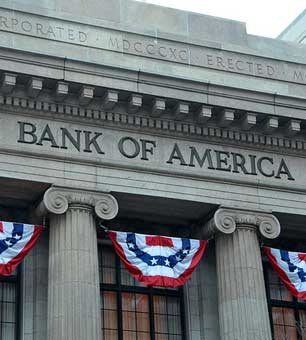The American banking industry is back and more dangerous than ever before.
According to the FDIC, U.S. banks posted a record $40.3 billion profit in the first three months of the year.
This staggering profit tops the previous first-quarter profit record that was set more than six years ago, before the financial crisis and big-bank caused Bush Great Recession.
So, now that the big banks have fully recovered from the financial crisis that they themselves caused, and are raking in massive profits yet again, you would think that they’d be extra careful not to cause another financial meltdown, right?
Wrong.
It’s appears that big bank Bank of America is up to the same old dirty tricks that helped contribute to America’s financial meltdown in the first place.
According to the American Banker magazine, Bank of America is using a misleading sales pitch and a flood of fine print to sell you and me on mortgage refinancing plans.
The American Banker reported Monday that a mailer in New Jersey from Bank of America, “sounds eerily like a sales pitch from the bubble days of 2005.”
The mailer talks about annual savings of more than $4,000 if borrowers refinance their mortgages, but according to National Consumer Law Center attorney Andrew Pizor, the refinancing offer would actually add more than $37,000 to the cost of a borrower’s loan.
Basically, the mailer focuses on lowering monthly mortgage payments, while neglecting to mention that the borrower would end up paying a higher overall interest rate, and would be adding 10 more years to the overall length of their loan.
Pizor told the American Banker that, “I think the pitch is kind of deceptive because it boldly mentions ‘save’ and ‘savings,’ repeatedly, and of course it refers only to the higher interest rate and overall loan amount in the footnotes.”
Back in November of 2012, the Consumer Financial Protection Bureau sent warning letters to around a dozen of America’s largest mortgage lenders and brokers, advising them to “clean up” potentially misleading advertisements, especially those targeting veterans and older Americans.
At the time of the CFPB’s announcement, CFPB director Richard Cordray said that, “Misrepresentations in mortgage products can deprive consumers of important information while making one of the biggest financial decisions of their lives.”
And, as we also know, deceptive mortgage advertisements like this can cause consumers to bite off more than they can chew, ultimately leading to a nationwide financial meltdown.
But, despite warnings from the CFPB, and seeing how similar actions led up to the housing and financial collapse, it looks like Bank of America is once again fine with luring consumers into mortgage packages they can’t afford.
And this shouldn’t come as a surprise.
Bank of America has a laundry list of abusive consumer practices, ranging from robo-signing fraud to “working” with homeowners on loan modifications while also trying to foreclose on them.
So, how do we stop big banks, like Bank of America, from dragging America into yet another financial collapse?
First and foremost, we need to bring back Glass-Steagall.
Under Glass-Steagall, we had two kinds of banks.
One was like your neighborhood bank. It did checkbooks, home loans, and savings accounts. Their technical name was “commercial banks.”
The second kind of bank was what was called an “Investment Bank,” where you bought and sold stocks, bonds, and commodities. Many of us used to call these places “brokerages,” places like Merrill Lynch used to be.
Glass-Steagall said that these two types of banks had to be different and separate, couldn’t even be owned by the same people, and couldn’t get into each other’s’ business.
Under Glass-Steagall, investment banks couldn’t gamble in the back room with the money in your commercial bank’s checking or savings account, and couldn’t hustle derivatives based on your mortgage.
But Republican Senator Phil Gramm, whose wife Wendy was on the Board of Enron, and Ken Lay and Gramm’s bankster buddies didn’t like that at all. Enron wanted to bank, to gamble, and to hustle everything from mortgage derivatives to energy derivatives. So, in the final year of the Clinton Administration, Phil Gramm and his buddies in Congress put an end to the Glass-Steagall Act that had been protecting us ever since the Great Depression.
After all, “What could go wrong?”
It’s time to put back into place the firewall between commercial and investment banks, and end banks that are too big to fail or jail, so that they can’t cause another American housing and financial disaster.
Let’s say goodbye to the out-of-control big banks, and once again make banking a safe, boring, and useful business with local roots in our communities.
Join us in defending the truth before it’s too late
The future of independent journalism is uncertain, and the consequences of losing it are too grave to ignore. To ensure Truthout remains safe, strong, and free, we need to raise $43,000 in the next 6 days. Every dollar raised goes directly toward the costs of producing news you can trust.
Please give what you can — because by supporting us with a tax-deductible donation, you’re not just preserving a source of news, you’re helping to safeguard what’s left of our democracy.
